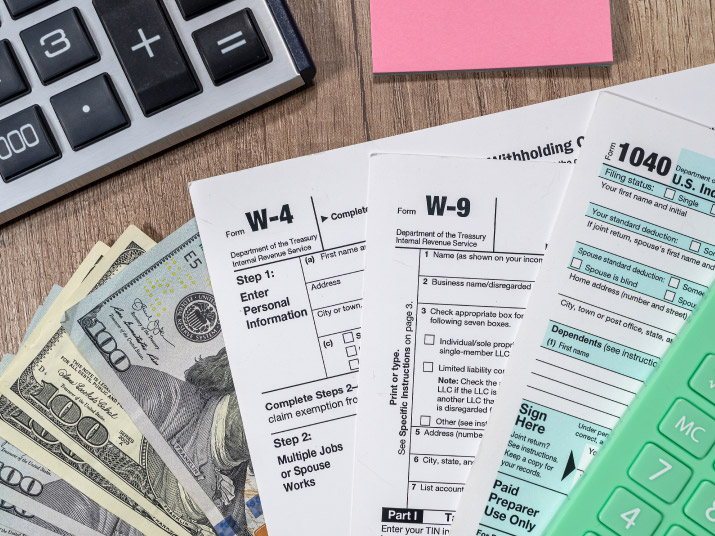Is a complete understanding of the US taxation system still eluding you?
Does the complexity and endlessness of IRS forms overwhelm you?
Well, we’re here to tell you that you are not alone.
Thousands of Indian IT professionals embark to America for better pay and jobs and often get caught up in the confusing web of filing their tax returns.
A new country and different laws can complicate tax season, but you can better handle it with some preparation and organization. So we’ve come up with the ultimate checklist to help you prepare for filing your taxes.
What are the Documents Required for Income Tax Return of Individuals?

Depending on your financial and personal context, the claims you make while filing your tax returns can vary. Therefore, multiple documents are often required, which can be hard to track.
Nevertheless, we’ve categorized the documents required for income tax return of individual per the functions they serve while filing your taxes. Read on to know exactly what you need to keep handy to sail through the tax season smoothly:
Personal Information and Dependent Information
Basic identification information is mandatory while filing tax returns. Be sure to include the following documents:
- Previous tax returns and statements for reference. The IRS has up to three years to decide on whether to audit an individual or not. In such a scenario, having copies of previous tax returns is necessary to ensure the best outcome.
- Social Security or Tax ID numbers and dates of birth of both you and your dependents, if any. Dependents include spouses, children, parents whom you provide for financially. In the case of child dependents, furnishing childcare records is advisable.
Income-Related Documentation

Your total income determines your tax bracket and how much tax you pay. However, you are legally required to file taxes for all the types of income you receive, including rental income, interest on investments, and profits made on anything you choose to sell in the year.
In addition, the US Government taxes Indian H1B holders on their global income and their US income. Therefore, you must declare any profit-generating assets back in India as a part of your income. It is advisable to keep the documents below ready and submit them as a part of your tax return:
- Form W-2: issued by your employer and states precisely how much tax was withheld from your pay.
- Form 1099 series: each form in this series has a different suffix to indicate the different types of revenues possible:
- 1099-INT: for income in the form of interest earned on investments.
- 1099-G: for government payments and tax refunds.
- 1099-K and 1099-MISC: for payments received for freelance gigs.
- 1099-R: for pension income.
- 1099-S: for income received upon the sale of stocks.
- 1099-B: for income received after selling a property.
- 1099-DIV: for dividends received for mutual fund investments.
- 1099-SSA: for Social Security benefits.
- Form 1040: to be used while declaring foreign income and reporting taxes paid in previous years.
- Cryptocurrency transaction records of sales, if any, and interest earned.
- Form 1095-A: for Health Insurance Marketplace Statements.
- Rental asset records: for income earned in the form of rent.
- Expense records: bank and credit card statements.
- Form W-4: for changing the amount of your income that is taxable, i.e., your tax withholding. It is advisable to revise it every year and make adjustments in congruence with life changes, for instance, marriage. Filing status is also quite important, and you may choose to continue filing your tax returns as an individual.
Claiming Deductions
Documenting expenses can often help you understand the deductibles you can claim, hence helping to lower your taxable income. If you have any of the documents below, compile them and submit them with your tax return to reduce your tax bill:
- Charitable donations: records of all donations (itemized and non-itemized) to 501 (c)(3) registered charities. There is no upper limit on itemized cash donations; for those who claim the standard deduction, the maximum deduction is $300.
- Homeownership documents: mortgage payments, property tax statements, moving expense records.
- Medical expense records: hospital and doctors’ bills, health insurance payments, Medical Savings Account contributions. Try to itemize all expenditures greater than 7.5% of your adjusted gross income. For HSA’s, contributions up to $3,600 for individuals are tax-deductible.
- Child Care expense documents: records of payments such as daycare or caretaker fees.
- Educational expense documents: tuition fees payments, student loan payments, expenditure on courses/supplies that improve skills related to your job.
- Retirement planning proofs: proofs of contributions made to IRA and 401k accounts. Contributions are up to $6,000 for those younger than 50 are tax-deductible.
- State and local income tax payment records: this deduction is capped at $10,000 for any payments toward local and state taxes.
Claiming Credits
Tax credits can help reduce your tax liability as an individual filing tax returns. Using popular credits often results in a lower tax bill and larger refund. Keep the following documents handy:
- Letter 6419: Child Tax Credits are worth up to $3,000 per qualifying child above the age of six and up to $3,600 for kids under six.
- Form 1116: for claiming foreign income tax credits, i.e., income earned from assets in India.
- Adoption documentation: for families with adopted children to claim Adoption Tax Credits.
- Proof of financial support provided to a dependent: individuals taking care of dependents without a steady income claim Dependent Tax Credits. This credit significantly reduces liability to offset the costs incurred.
The Bottom Line
There’s nothing like the feeling of calm when confronting something as monstrously overwhelming as tax season. Being organized is the key to being prepared, so make sure to use this checklist to get your documents in order.
If you’re still unsure about the best way to file your returns and which deductions and credits are best suited to your situation, sign up for free with AOTAX today to get your questions answered.
AOTAX’s mission over the last 15+ years has been to help Indian IT professionals in the US. We have a dedicated team to solve all your queries and help you get the most from your tax returns.


Recent Comments